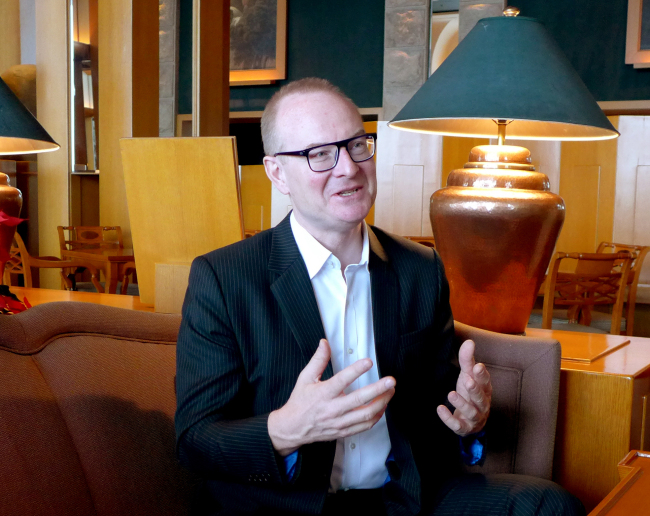[HERALD INTERVIEW] ‘Smart branding essential in innovative economy’
By Korea HeraldPublished : Dec. 17, 2015 - 18:29
In an innovative global economy, branding is no longer a nicety, but a necessity that guarantees the success of companies and countries worldwide, Danish business consultant Martin Roll argued.
A long-time resident of Singapore, Roll, who authored “Asian Brand Strategy,” has offered advice for navigating the volatile international marketplace to Fortune 500 companies and leading Asian enterprises and family-owned businesses with a focus on Asia.
“It’s time for Korea to project confidence for what it stands for. You are not an underdog anymore,” Roll said in an interview with The Korea Herald last week. “China’s rise will continue and Japan will have its place as the world’s third-largest economy, but a very large space exists for Korea both in Asia and the world.”
A long-time resident of Singapore, Roll, who authored “Asian Brand Strategy,” has offered advice for navigating the volatile international marketplace to Fortune 500 companies and leading Asian enterprises and family-owned businesses with a focus on Asia.
“It’s time for Korea to project confidence for what it stands for. You are not an underdog anymore,” Roll said in an interview with The Korea Herald last week. “China’s rise will continue and Japan will have its place as the world’s third-largest economy, but a very large space exists for Korea both in Asia and the world.”

Roll, who has been to Korea more than 200 times, visited Seoul to conduct a workshop on branding a country at the invitation of the Danish embassy. Aside from running his consulting firm Martin Roll Company, he is a goodwill ambassador for Denmark, attracting tourists and investment back home through personal networks. Roll earned his Master of Business Administration degree from business school INSEAD.
Unlike 15 years ago, when Westerners had difficulties differentiating between Asian countries, Roll said the global dominance of leading Japanese and Korean firms helped enhance the brand image of their respective countries in Europe. Korea, Japan and increasingly China are recognized as hotbeds of innovation and allure, he said.
In Denmark, Korea is associated with technological and cultural sophistication, Roll noted, as international brands such as Samsung, Hyundai and AmorePacific have become part of Danish life.
“Innovation is also not only about technology. It has to come with storytelling,” he stressed. “It’s about making consumers understand where the technology comes from.”
As Korea has a wealth of assets yet to be unearthed from its long history, Roll highlighted that popularizing these customs, artifacts, identities and food could enrich the intangible value of modern-day products and services.
Danish toy brand Lego, he noted, has incorporated the essence of Danish children’s playfulness and creativity.
“Lego capitalized on the notion of play, which is universal, and established its brand that way,” Roll said. “It is not necessary to have the national flag on your products, but using the national identity appropriately can help lift your brand image.”
Roll also cited the Danish multinational pharmaceutical company Novo Nordisk, which has championed the Nordic ideals of professionalism, authenticity and transparency; as well as the French cosmetics firm L’Oreal, which has globalized French beauty and elegance.
In a new business paradigm, businesses can reap the benefits of partnering with public organizations and vice versa, he said. Tourism, trade and inbound investment agencies, such as Korea’s Ministry of Culture, Tourism and Sports, the Singapore Tourism Board and the Singapore Economic Development Board, increasingly employ the national brand, he indicated.
The strength of the Danish public-private partnership lies in its nonhierarchical and participatory nature: “As an entrepreneur in Denmark, you feel very close to the government and politicians. Red tape is minimal and even our queen and prime minister engage average Danes in one way or another.”
Nova Nordisk CEO Lars Rebien Sorensen, who was named the world’s top business leader by Harvard Business Review two months ago, eats in the company cafeteria, talks to employees from the boardroom to the cleaning room and flies on regular airlines, Roll said.
“This means that when employees go to work, they feel like they are part of the organization, feeling empowered, balanced and involved. They feel they are doing meaningful work.”
Parents can pick up children from kindergarten at 3:30 p.m., and take long maternity leaves. People swim in the Copenhagen Harbor. Conglomerates promote green initiatives. And there is lots of room for play at school.
“Being in control of your life, as a master and architect of your career, not being too worried about money. If you add up all of that, being happy in Denmark is natural.”
Roll noted that Denmark and Korea can cooperate in the green economy, adding that Korea’s production and engineering competence and Denmark’s innovation and management acumen can be harmonized for synergy.
“Like Denmark’s place within the European Union, Korea can position itself as a sophisticated and innovative hub in Asia,” he said. “You don’t need to be overly concerned about China’s rise. China’s challenges in cleaning up its environment and feeding, housing and educating people present enormous opportunities.”
Like Singapore, which has become a connector between Northeast Asian and Southeast Asian markets, Roll suggested Korea could brand itself as a cosmopolitan hub of East Asia for the neighboring economies and cultures.
By Joel Lee (joel@heraldcorp.com)
-
Articles by Korea Herald






![[KH Explains] How should Korea adjust its trade defenses against Chinese EVs?](http://res.heraldm.com/phpwas/restmb_idxmake.php?idx=644&simg=/content/image/2024/04/15/20240415050562_0.jpg&u=20240415144419)












![[Today’s K-pop] Stray Kids to return soon: report](http://res.heraldm.com/phpwas/restmb_idxmake.php?idx=642&simg=/content/image/2024/04/16/20240416050713_0.jpg&u=)